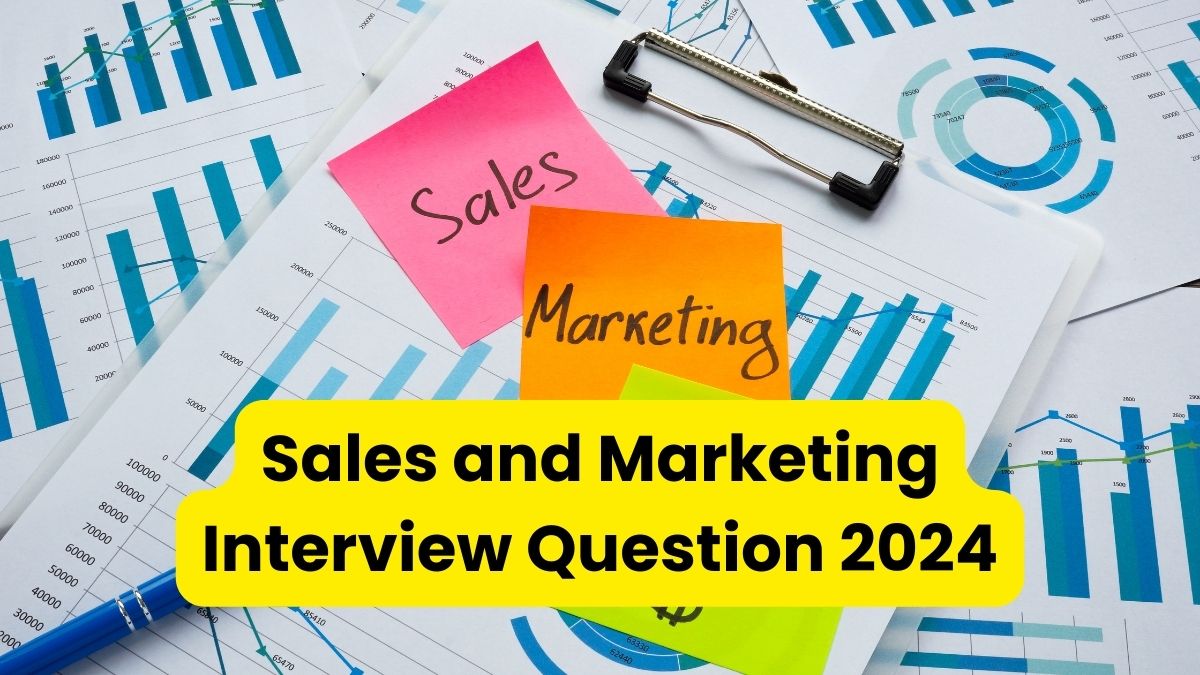Preparing for sales and marketing interview questions requires understanding both fields deeply and being able to articulate your experiences and skills effectively.

Here are some key points to consider and common interview questions you might encounter:
Key Points to Consider:
1. Understanding the Role:
Know the specific responsibilities of the sales and marketing role you are applying for.
2. Company Research:
Be familiar with the company’s products, services, market position, and competitors.
3. Skills and Experience:
Highlight relevant skills such as communication, negotiation, data analysis, and creativity. Use examples from your past experiences.
4. Metrics and Successes:
Be ready to discuss specific metrics and successes from your previous roles, such as sales targets met, campaigns executed, or market research conducted.
Sales and Marketing Interview Questions and Answers

1. What are Sales and Marketing? Are they the same?
Sales and marketing are different but related. Marketing involves finding potential customers and creating interest in a product, while sales focus on convincing interested customers to buy. Marketing continues after the sale to build loyalty, whereas sales end once the purchase is made.
2. What is Sales Management? Is it the same as Sales Force Management?
Sales management involves setting sales targets, monitoring conversion rates, and establishing sales methods. Sales force management, however, focuses on managing the sales team, including setting goals, providing training, giving feedback, and assigning tasks. While sales management is about the overall sales process, sales force management is about the people who execute it.
3. What is Marketing Management? How is it different from Integrated Marketing?
Marketing management is about making sure your product or service is noticed, understood, and discussed among your target audience. It involves selecting the right target market and using resources efficiently. Integrated marketing, on the other hand, is about coordinating all your marketing efforts across different channels to deliver a consistent message, ensuring that the core meaning and emotion remain the same.
4. Can you explain the concept of a sales funnel?
A sales funnel represents the journey potential customers take from initial interest to final purchase. It begins with attracting leads, who are then engaged through calls or emails. Successful interactions lead to follow-ups and nurturing efforts, eventually converting the leads into paying customers.
5. Can you describe the Product Life Cycle?
The Product Life Cycle outlines the stages a product experiences from its market introduction to its exit. It begins with the introduction stage, where the product is launched and initial awareness is built. If successful, the product enters the growth stage, where sales and market share increase. This is followed by the maturity stage, where sales peak and the market becomes saturated. To prevent a decline, strategies must be employed to maintain interest. Without these efforts, the product enters the decline stage, where sales drop, eventually leading to the product being phased out of the market.
6. Why is understanding the Product Life Cycle important?
Knowing the Product Life Cycle (PLC) helps businesses manage their products effectively. For example, Nokia and Kodak cameras didn’t adapt well to market changes and eventually disappeared. On the other hand, the iPhone continues to innovate and grow, even in the maturity stage. Understanding the PLC allows companies to strategize appropriately at each stage to maximize product longevity and market presence.
7. What does marketing communication entail?
Marketing communication refers to the strategic process of conveying a message about a product or service to target customers. It involves crafting compelling messages that resonate with the audience, using various channels and tools to reach them effectively. The goal is to inform, persuade, and ultimately influence consumer behavior, leading to increased awareness, interest, and ideally, conversion. This process ensures that the offering is not only heard but understood in a way that motivates potential customers to take action, whether it’s making a purchase, signing up for a service, or engaging further with the brand.
8. What are the seven core elements(7C’s) that guide effective marketing strategies and practices?
- Client: Understanding your target audience deeply.
- Competition: Analyzing competitors for strategic advantage.
- Consistency: Maintaining uniformity in branding and messaging.
- Content: Creating valuable and relevant content.
- Convenience: Ensuring easy and seamless customer experiences.
- Communication: Engaging effectively with your audience.
- Creativity: Implementing innovative marketing strategies.
- Credibility: Building trust through transparent practices.
These principles collectively guide effective marketing strategies, emphasizing customer-centricity, differentiation, and trust-building in the marketplace.
9. Explain 7P’s of marketing.
Here’s a simplified explanation of the 7P’s of marketing:
- Product: What you offer to meet customer needs (e.g., features, design, quality).
- Price: Setting the right price based on market factors and perceived value.
- Place: How and where customers can access your product or service (e.g., distribution channels).
- Promotion: How you communicate with customers to persuade them to buy (e.g., advertising, promotions).
- People: The personnel involved in delivering the product or service (e.g., customer service).
- Process: Procedures and systems used to deliver products or services efficiently (e.g., order processing).
- Physical Evidence: Tangible elements that customers experience (e.g., packaging, branding)
10. What are the various market structures that businesses operate within?
Here are the types of sales markets listed,
a) Monopolistic Competition
b) Oligopoly
c) Pure Competition
d) Pure Monopoly
11. What are the key characteristics of a pure competition market?
Here are the characteristics of a pure competition market rephrased:
a) Abundance of buyers
b) Plenitude of sellers
c) Intense competition for units sold
d) Uniform pricing per unit for identical products
e) Price determined by market demand and supply dynamics
12. What are the defining characteristics of monopolistic competition?
a) Multiple sellers
b) Limited buyers
c) Differentiated product
d) Healthy competition
e) Less poaching
|f) Price is not the standard price
g) Fewer substitutes
13. ) What are the key features of an oligopoly market in sales and marketing?
a) Limited number of sellers
b) Discerning buyers
c) Similar products
d) Diverse products
e) Scarce alternatives
f) Specialized market segment
g) Reduced reliability
h) Minimal seller overlap
14. What are the defining characteristics of a pure monopoly in sales and marketing?
a) Sole seller
b) No competitors
c) Major buyers
d) Limitless sales potential
e) Untapped market
f) Innovative product, line, or market
g) Barrier to competition
h) Requirement for substantial resources
i) No near alternatives
j) Achievable with substantial government support
k) Challenging to hinder or rival in the open market
15. What’s the difference between impulsive buying and the bandwagon effect in consumer behavior?
Impulsive buying is when you purchase something without thinking, driven by a sudden urge or desire for personal satisfaction.
The bandwagon effect is also impulsive buying, but it’s more about following trends or showing off, even if the product isn’t really needed. It’s about fitting in or boosting your image.
16. What are the key components that make a marketing campaign effective and successful?
- Target Audience: Identifying the specific group or demographic the campaign aims to reach.
- Value Proposition: Clearly defining and communicating the unique benefits of the product or service.
- Call to Action (CTA): Prompting the audience to take a specific action, such as making a purchase or signing up.
- Delivery Channels: Choosing the appropriate platforms to execute the campaign.
- Follow-Up Strategy: Nurturing leads and maintaining engagement after initial contact.
17. Why has digital marketing become increasingly popular in recent times?
- Shift in Consumer Behavior: Increased online activity for shopping, entertainment, and socializing.
- Targeted Reach: Precise targeting of specific demographics and audiences.
- Measurable ROI: Real-time analytics for tracking campaign success.
- Cost-Effectiveness: Lower costs compared to traditional marketing channels.
- Adaptability and Flexibility: Quick adjustments based on real-time data.
- Global Reach: Ability to reach global audiences effortlessly.
- Impact of Global Events: Accelerated importance due to events like pandemics, emphasizing digital presence and e-commerce capabilities.
18. How does optimization play a role in marketing strategies?
- Operational Optimization: Refining marketing research processes for better data analysis.
- Financial Optimization: Efficient management of marketing expenses to maximize ROI.
- Business Optimization: Strategic development to enhance overall business performance.
- Digital Optimization: Improving online visibility and engagement through SEO and social media management.
Together, these optimizations ensure that marketing efforts are targeted, cost-effective, strategically aligned, and optimized for digital success.
19. In which types of business transactions are you most skilled: B2B, B2C, C2C, or D2C?
Understanding B2B (Business-to-Business) marketing is crucial as it operates distinctly from B2C (Business-to-Consumer), D2C (Direct-to-Consumer), and C2C (Customer-to-Customer) transactions. Each type involves unique dynamics and strategies tailored to its specific market participants and consumer interactions.
20. How significant is the role of marketing and sales research?
In sales and marketing interviews, the focus often centers on data. Every consumer interaction, feedback, action, emotion, and response contributes to a wealth of information. This data is instrumental in generating insights and guiding strategic decisions.
FAQ’s
1. How much can sales and marketing professionals expect to earn in India?
Sales and marketing professionals in India typically earn an average salary ranging from ₹4 lakhs to ₹12 lakhs per annum at entry-level positions. This range can vary based on factors such as experience, industry sector, specific role responsibilities, and geographic location within the country.
2. Where do sales and marketing professionals typically work?
Sales and marketing professionals can be found in various industries such as FMCG (Fast-Moving Consumer Goods), IT/software, e-commerce, advertising, retail, pharmaceuticals, real estate, and telecommunications.
3. What skills do sales and marketing professionals need to excel?
Sales and marketing professionals require essential skills such as effective communication, strong interpersonal abilities, analytical thinking, negotiation prowess, creativity, and adaptability to evolving market trends.
4. Which courses are beneficial for individuals aspiring to enter sales and marketing?
Sales and marketing beginners can gain valuable skills from courses in digital marketing, market research, CRM, sales management techniques, and related areas. These courses equip them with knowledge to succeed in competitive marketing
Read More
- How To Use Facebook Ad Library To 10X Your Ads
- What is Voice Search Optimization? How to use it ?
- The Best Ways How To Monetize Your Website.
- Top 30+ Digital Marketing Interview Questions.
- AI In Digital Marketing-Ultimate Guide
- How To Delete Linkedin Account: Complete Guide-2024
- How To Download Linkedin Video On Online?
- How is the Digital Marketing different from Traditional Marketing.
- Top Digital Marketing Agencies in Bangalore
- Top Digital Marketing Companies In India
- How to Start a Digital Marketing Agency in 2024?
- Digital Marketing Salary In India?
- How to Create a 3D Social Media Image in bing?
- How to Become a Digital Marketer In 2024
- What is Freelance Digital Marketing ? How Much Earn?
- What is Google Digital Garage? Step by Step Guide
- Free Digital Marketing Course With Top Certificates By Google.
- Digital Marketing is a Good Career Option-2024.
- Digital Marketing Syllabus in 2024
- MBA in Digital Marketing: Requirements, Opportunities, and Earnings
- Advantages and Disadvantages of Social Media for Student’s
- Best Top SEO Company In India- 2024
- SEO Interview Questions and Answer- latest 2024
- What is Combining SEO and Content Marketing? Complete Guide-2024
- Top Google Ads Interview Questions and Answers.
- What is Online Advertising ? And Types of Online Advertising ?
- What is Google Ads Credit? And How Do I Claim for Google Ads 2000 Credit?
- Top 30+ Google ads Interview Questions and Answers
- How Can Google Ads Help You Advance Your Business Goals.
- Where Can Your Ads Appear in Search Engine Marketing?
- When Advertising Using Search Engine Marketing(SEM) You Only Pay?
- How to use chat gpt for free: Step by Step guide
- How to use chat gpt for free: Step by Step guide
- How To Use Chat Gpt 4 for Free?
- What is Content Marketing in Digital Marketing?
- What is Marketing Strategy? How do you develop an effective Marketing Strategy?
- Best Performance Marketing Agencies In India?
- What is Performance Marketing Strategy ?
- Pros and Cons of Traditional and Digital Marketing
- What is the Digital Marketeting Funnel ?
- What is Performance Marketing?
- Advantages & DisAdvantages of Digital Marketing.
- What is Social Media Optimization? 7 Tips To Grow Your Social Media.
- Is What’s App a Social Media Platform ?
- Is You Tube Social media Platform? Everything You Need to know
- Is Social Media Getting Banned in India?
- How to Earn Money from Social Media?
- Advantages of Social Media | Some Key Benefits Of Social Media
- Freelance Digital Marketing Jobs in 2024-Complete Guide.
- Career In Digital Marketing: A Complete Guide 2024
- How to Use Google Adsense & Other Options To Monetize Your Website
- How to become a Content Marketer? A Complete Guide 2024

